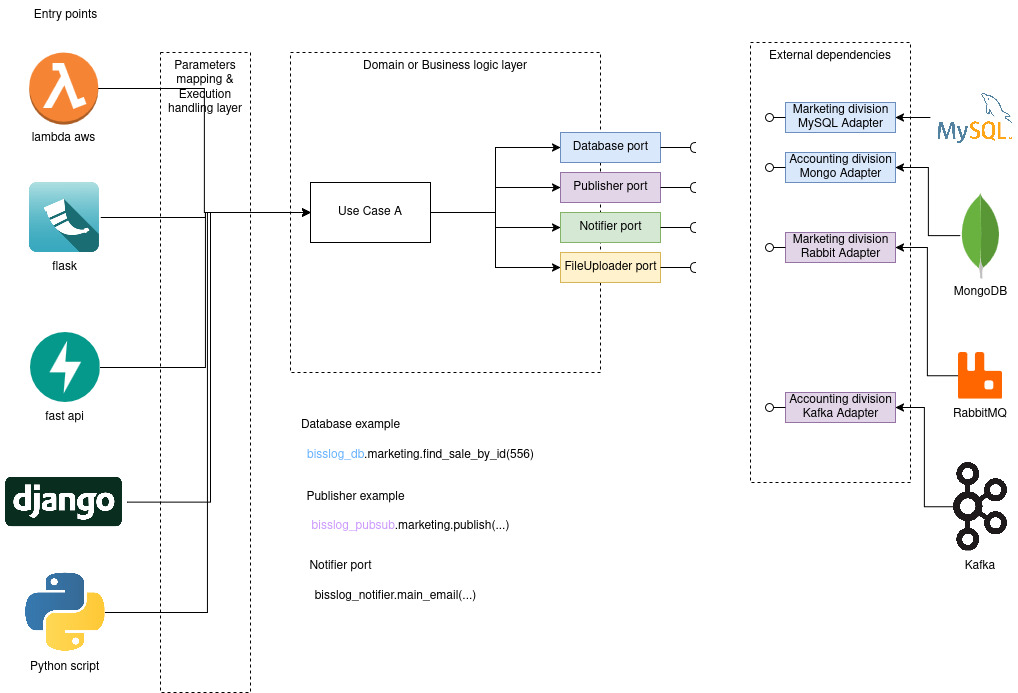
Security News
MCP Steering Committee Launches Official MCP Registry in Preview
The MCP Steering Committee has launched the official MCP Registry in preview, a central hub for discovering and publishing MCP servers.
Business logic core (bisslog-core) - A lightweight and dependency-free implementation of Hexagonal Architecture (Ports and Adapters) in Python.
bisslog-core is a lightweight and dependency-free Python library that implements the Hexagonal Architecture (Ports and Adapters).
It enforces a strict separation between domain logic, application, and infrastructure, allowing easy integration with different frameworks and external services without modifying core business logic.
This library serves as an auxiliary layer for business logic or service domain, providing a common language for operations when interacting with external components.
In other words, the business rules remain unchanged even if the infrastructure changes (e.g., switching the messaging system).
The key principle is:
"The domain should not change because some adapter changed."
It is designed for backend functionality, framework-agnostic development, and to minimize migration costs.

You can install bisslog-core using pip:
pip install bisslog
Here is an example of what the implementation of a use case looks like without importing any additional dependencies.
Note: if the adapter is not implemented it will give execution attempt messages.
from random import random
from bisslog.database.bisslog_db import bisslog_db as db
from bisslog.use_cases.use_case_full import FullUseCase
from bisslog import use_case
from scripts.project_example_1.usecases.my_second_use_case import my_second_use_case
class SumarUseCase(FullUseCase):
@use_case # or simply def use()
def something(self, a: int, b: int, user_id: int, transaction_id: str, *args, **kwargs) -> dict:
component = self._transaction_manager.get_component()
self.log.info("Receive a:%d b:%d %s", a, b, component, checkpoint_id="reception",
transaction_id=transaction_id)
# Retrieve last session
last_session = db.session.get_last_session_user(user_id)
if last_session is not None:
self.log.info(f"Last session of user {user_id} fue {last_session}",
checkpoint_id="last_session")
db.session.save_new_session_user(user_id)
db.event_type.loadWebhookEventType(5)
rand = random()
new_value = my_second_use_case(value=rand*10, product_type="string2", transaction_id=transaction_id)
# Calculate result
res = a + b
if res > 10:
self.log.warning("Es mayor que 10", checkpoint_id="check-response")
# Publish event
self.publish("queue_suma", {"suma": res + new_value, "operation": "a + b"})
return {"suma": res}
sumar_use_case = SumarUseCase("sumar")
from bisslog import use_case, domain_context, transaction_manager, bisslog_upload_file
log = domain_context.tracer
@use_case
def my_second_use_case(value: float, product_type: str, *args, **kwargs) -> float:
log.info(
"Received %d %s", value, transaction_manager.get_component(),
checkpoint_id="second-reception")
if product_type == "string1":
new_value = value * .2
elif product_type == "string2":
new_value = value * .3
elif product_type == "string3":
new_value = value * .5
else:
new_value = value * .05
uploaded = bisslog_upload_file.main.upload_file_from_local("./test.txt", "/app/casa/20")
if uploaded:
log.info("Uploaded file component: %s", transaction_manager.get_component(),
checkpoint_id="uploaded-file")
return new_value
For the configuration of the entry-points or primary libraries, they will only have to call the corresponding use case and map the fields. Here is an example with FastAPI. More examples
from typing import Annotated
from fastapi import FastAPI, Header, HTTPException
from scripts.project_example_1.usecases.my_first_use_case import sumar_use_case
app = FastAPI()
@app.get("/fast-api-example/first-use-case/{a}/{b}")
async def get_user(a: str, b: str,
user_id: Annotated[str | None, Header()]):
print(a, b, user_id)
if user_id is None:
raise HTTPException(status_code=400, detail="user_id is required")
res = sumar_use_case(int(a), int(b), int(user_id))
res["identifier"] = "fast-api"
return res
Definition of possible interfaces of divisions needed by the database, if not, it does not matter.
from abc import ABC, abstractmethod
from typing import Optional
from bisslog.adapters.division import Division
class SessionDivision(Division, ABC):
@abstractmethod
def save_new_session_user(self, user_identifier: int) -> None:
raise NotImplementedError("save_new_session_user not implemented")
@abstractmethod
def get_last_session_user(self, user_identifier: int) -> Optional[dict]:
raise NotImplementedError("get_last_session_user not implemented")
The following is a dummie implementation of the above division to give an example
import uuid
from datetime import datetime, timezone
from typing import Optional
from scripts.project_example_1.database.session_division import SessionDivision
cache_db = {"session": []}
class SessionDivisionCache(SessionDivision):
def get_last_session_user(self, user_identifier: int) -> Optional[dict]:
user_sessions = [session for session in cache_db["session"]
if session["user"] == user_identifier]
if not user_sessions:
return None
return user_sessions[-1]
def save_new_session_user(self, user_identifier: int) -> None:
cache_db["session"].append({"user": user_identifier, "id": uuid.uuid4().hex,
"created_at": datetime.now(timezone.utc)})
session_division_cache = SessionDivisionCache()
To Run test with coverage
coverage run --source=bisslog -m pytest tests/
To generate report
coverage html && open htmlcov/index.html
This project is licensed under the MIT License. See the LICENSE file for details.
FAQs
Business logic core (bisslog-core) - A lightweight and dependency-free implementation of Hexagonal Architecture (Ports and Adapters) in Python.
We found that bisslog demonstrated a healthy version release cadence and project activity because the last version was released less than a year ago. It has 1 open source maintainer collaborating on the project.
Did you know?

Socket for GitHub automatically highlights issues in each pull request and monitors the health of all your open source dependencies. Discover the contents of your packages and block harmful activity before you install or update your dependencies.

Security News
The MCP Steering Committee has launched the official MCP Registry in preview, a central hub for discovering and publishing MCP servers.

Product
Socket’s new Pull Request Stories give security teams clear visibility into dependency risks and outcomes across scanned pull requests.

Research
/Security News
npm author Qix’s account was compromised, with malicious versions of popular packages like chalk-template, color-convert, and strip-ansi published.